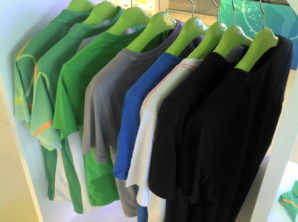
 The iconic T-shirt has become the unwitting symbol of irresponsible apparel manufacturing since the 2009 book by Georgetown Professor Pietra Rivoli, “Travels of a T-shirt in the Global Economy” was published, and the myth has been further perpetuated by Adam Davidson of New York Times, NPR, and Planet Money as he labels all that is wrong with the apparel industry as the “T-shirt phase” of a business model. Let me be clear, Davidson is not intentionally making T-shirt companies the poster child of bad practice but rather repeating the use of this misnomer. Since the recent spate of tragic incidents in Bangladesh apparel factories has placed the issue of ethical sourcing in retail/ eTail in the news and elevated the urgent need for collective corporate responsibility in the industry, let’s take a look at the issue of ethical sourcing in the US and abroad.
The iconic T-shirt has become the unwitting symbol of irresponsible apparel manufacturing since the 2009 book by Georgetown Professor Pietra Rivoli, “Travels of a T-shirt in the Global Economy” was published, and the myth has been further perpetuated by Adam Davidson of New York Times, NPR, and Planet Money as he labels all that is wrong with the apparel industry as the “T-shirt phase” of a business model. Let me be clear, Davidson is not intentionally making T-shirt companies the poster child of bad practice but rather repeating the use of this misnomer. Since the recent spate of tragic incidents in Bangladesh apparel factories has placed the issue of ethical sourcing in retail/ eTail in the news and elevated the urgent need for collective corporate responsibility in the industry, let’s take a look at the issue of ethical sourcing in the US and abroad.As the CEO of Spreadshirt, an e-commerce platform for creating, buying, and selling of ideas on things that consumers love to share, use, and carry, T-shirts are a staple of our global business. I hope to clear up what is clearly an oxymoron in the American business psyche. In fact, the label of “T-shirt phase” is actually a proud label for ethical practice in the apparel industry in first world highly evolved businesses.
T-Shirts are fun and T-shirt companies and wearers are largely people who want to enjoy the product. But, as in every industry, there are some people who cut corners–and this can lead to accidents. We have all observed the devastating results in Bangladesh for careless practices and accidents.
By nature, T-shirt production is not an exploitative industry that destroys or depletes natural resources like international businesses, which extract oil, minerals, or natural resources and only use local labor. Both environmental damage and economic collapse result after the resource is used up. Even tourism can be devastating, as often the very features tourists came to see are overdeveloped until they are destroyed. Mostly, again, by big international companies who bring in foreign management and only use locals for lowest labor–with the end result, destruction of natural resources and an unstable economic system.
Contrast this with the T-shirt production business that use outsourced production of products mostly through local manufacturers. This develops local business owners and local middle class management. To lay the blame on “The T-Shirt phase” is a knee-jerk reaction, completely wrong and misleading. Outsourcing of manufacturing, when done right, is a very positive experience for everyone–that is why we do it.
Developing countries have several phases they go through, and the “The T-Shirt phase” is the positive turnaround point, which looks something like this:
1. Extremely Bad: Political Corrupt Government led by Superpower agendas
2. Extremely Bad: War zones good for the armaments industry
3. Bad: Peace zone with overspending NGO projects
4. Bad: The first commercial phase of exploiting country for natural resources
5. Good: Manufacture of Saleable Goods from Natural Resources. The retention of profit within the country. [True T-Shirt Phase]
6. Good: Development of middle class running businesses doing manufacturing
7. Very Good: Development of own internal economy from new middle class
8. Very Good: Development of service industries and infrastructure funded from Middle Class taxes and economy.
The worst thing a first world business can do to a developing economy is take away the ability for that economy to retain profit from the goods manufactured from the raw materials that country produces.
Does this mean that the iconic T-shirt will cost big bucks to be made ethically, or that inexpensive T-shirts and apparel are really something to be ashamed of wearing?
Of course not! At Spreadshirt, we launched our Spreadshirt Collection in Europe in March and will launch it in mid September in the US. We have worked closely with Switcher, a leading textile manufacturing firm that guides corporations in corporate responsibility, to produce apparel that is ethically sourced and produced in accordance with Fair Trade and Fair Wear. Each product is completely retractable via respect-code.org. Conscious consumers can enter the product code of each item and it will provide an infographic and further insights of the production journey of the item. Our customers and team want quality and value but not at any price.
Inevitably there will be problems and even more accidents. This is how people and countries develop. Only people and countries that do nothing make no mistakes. Yes, our American Wear Your Heart on Your Sleeve products will be made in Bangladesh, but that does not mean that the labor force is exploited. Our Bangladesh sourced product is made there because they offer a very good quality product in a quality factory and at a good price. The DNA codes in every product show consumers exactly what a powerful symbol an ethically sourced T-shirt can be and wear it proudly.
